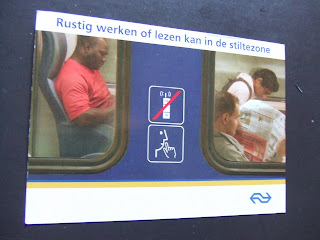
I am already on the alert while approaching the multi-story building – in the absence of a sidewalk, I’m forced to walk either on the rim of the bicycle path or in the soggy grassland at its edge, where my foot is quickly engulfed by mud. The bicycles hurtling along the straight stretch of road before the curve around the building are being pedalled at significant speed, the cyclists absorbed in phone conversations, composing text messages or pressing ahead to meet deadlines – the options for the pedestrian aren’t good.
As I reach my destination, a broad sidewalk looms, but weaving around abutments near the front entrance reinforces the vigilant mode – one of the outdoor columns under the overhead protrusion of the first floor is built in at a sharp slant. The column's trajectory appears haphazard and does not enhance a sense of stability.
To my relief, the mood is altered inside, where a front desk belies activity: computer lights blink, rotating stools are askew, as if just vacated, and the digital sign board and clock are blinking. The message is that security measures are in force, but nobody is around to scrutinize my arrival.
In the utter silence I proceed to the upper stories: along a ramp, a staircase, a transitional passage which leads through a dining zone (closed today, the packaged ingredients safe behind a roller shutter) and past the elevator, which I board. The meeting room I must find has a number in the thousands, but one digit provides the clue to the actual floor, where I emerge and see another glimmering digital display, directed, it seems, at me, condemning me to this empty stretch with information indicating that I have arrived.
Along the open-plan dual-passage hallway, through the ceiling-high windows bordering office spaces equipped with high-tech gear, I see no one, I hear no one, and a dream-like mist descends as I inspect the lifeless corridor. I decide to walk back to double-check the location details and en route I encounter the evacuation chair, neatly fastened to a central wall. The white figures on the green plastic are my only company this day – my eyes dart from the word ‘escape’ back to the digital sign board on the opposite wall and then to the elevator door, where a menacing grind warns of its opening.










